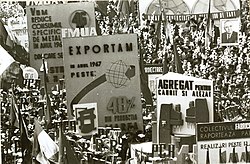Alfred Ajayi
Workers’ Day, also known as International Workers’ Day or Labour Day, is celebrated globally on May 1st to honour the contributions and struggles of workers and the labor movement.
It resulted from the fight for workers’ rights, especially the demand for an eight-hour workday, and the broader struggle against exploitation during the industrial era.
It is traced to the Industrial Revolution in the late 18th to early 19th century which brought dramatic changes to labour as factories started employing large numbers of workers under harsh conditions.
These include: long work hours (up to 16 hours/day), low wages, child labour, unsafe working environments. These exploitative tendencies necessitated the formation of labour unions and the resultant increasing demands for improved rights and conditions.
Following the formation of labour movements, the clamour for eight-hour workday became one of the central demands across the 19th century. Workers unions drove the campaign under the slogan, “Eight hours for work, eight hours for rest, and eight hours for what we will.”
This advocacy actually started in the United States in the 1860s. Two decades after in the 1880s, the movement had grown significantly. The turning point was however the Haymarket Affair in 1886. The May 1 1886 events in Chicago are pivotal to the history of Workers’ Day.
It saw over 300,000 workers across the U.S down tool to demand the eight-hour workday. The protests were particular intense in Chicago, especially at the McCormick Harvesting Machine Company. A peaceful rally at Haymarket Square on May 4, 1886, became violent and fatal when the protesters threw a bomb at police.
The police responded by opening fire leading to the death of several people, while many others sustained varying degrees of injury. In the process, the police arrested eight anarchists who were later tried and four of them hanged. One other committed suicide before three of them eventually got pardon.
Haymarket Affair as a symbol of struggle
The Haymarket Affair thereafter became a symbol of the struggle for workers’ rights and labour activists worldwide commemorated it. It was in 1889 that Labour Day got international recognition.

The Second International – a gathering of socialist and labor parties in Paris, declared May 1st as International Workers’ Day, to commemorate the Haymarket events and promote workers’ rights globally. The day quickly enjoyed adoption across Europe by socialist and labor movements in France, Germany, Spain, Italy, and Russia.
Countries like Brazil, Argentina, and Mexico in the Latin America started commemorating the day in the early 20th century, while Africa and Asia countries following their attainment of independence adopted the day as a public holiday to recognize the role of labour in nation-building.
Specifically, the day became an official public holiday in Nigeria in 1981 under the administration of President Shehu Shagari. The efforts of members of the Nigeria Labour Congress (NLC), which came into existence in 1978 through the merger of four labor organizations, drove the process.
The african situation
In many African countries, commemoration of May Day features various activities such as rallies and parades, speeches by labour leaders and government officials, review of workers’ welfare and rights, and most importantly calls for wage increases, improved conditions, and job creation.
As they commemorate the 2025 May Day, workers within public and private sectors in Nigeria are still yearning for substantial increase in the national minimum wage, citing the escalating cost of living. Unfortunately, the 70,000 minimum wage signed in 2024 by the Federal Government has not been properly and wholistically implemented at various levels of government.
Workers are also calling for a reversal of electricity and telecom tariff hikes, which they call burdensome to Nigerians who are already facing unprecedented economic strain.
They are also demanding settlement of pension arrears, the establishment of a national minimum pension, and the reactivation of gratuities for public servants. Workers equally seek the preservation of the Pension Transitional Arrangement Directorate (PTAD) and the payment of previously promised palliatives to pensioners.
They are also asking for the extension of retirement age for civil servants from 60 to 65 years and to extend the years of service from 35 to 40. This is to align it with adjustments which government has already made for teachers and judges.
Expectedly on a day like this, government from the federal to local levels have been expressing commitments and rolling out promises towards improved workers welfare. How soon and far will they fulfill the promises? Only time will tell.






I have not checked in here for a while because I thought it was getting boring, but the last several posts are great quality so I guess I will add you back to my daily bloglist. You deserve it my friend 🙂
Good to hear this.
I’m still learning from you, as I’m making my way to the top as well. I certainly enjoy reading everything that is written on your site.Keep the stories coming. I loved it!
Great beat ! I would like to apprentice while you amend your web site, http://www.hairstylesvip.com how could i subscribe for a blog site? The account helped me a acceptable deal. I had been a little bit acquainted of this your broadcast provided bright clear concept
Thanks for posting. I really enjoyed reading it, especially because it addressed my problem. http://www.kayswell.com It helped me a lot and I hope it will help others too.
I want to thank you for your assistance and this post. It’s been great. http://www.kayswell.com
Thank you for sharing this article with me. It helped me a lot and I love it. http://www.kayswell.com
Thank you for writing this post! http://www.kayswell.com
Thank you for sharing this article with me. It helped me a lot and I love it. http://www.kayswell.com
Hmm is anyone else experiencing problems with the pictures on this blog loading? I’m trying to figure out if its a problem on my end or if it’s the blog. Any feed-back would be greatly appreciated.
Pls be specific